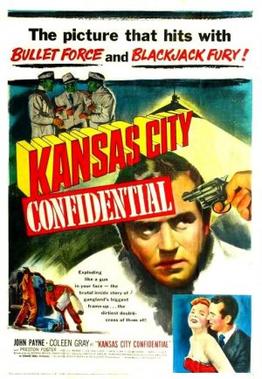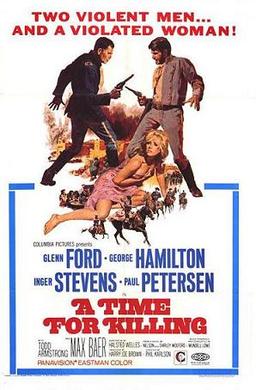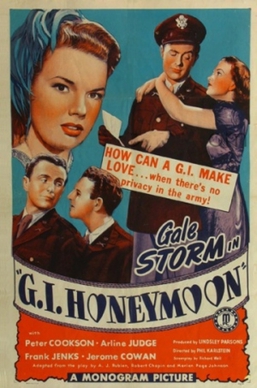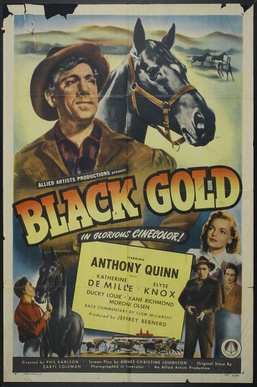Related Research Articles

William Alexander "Bud" Abbott was an American comedian, actor and producer. He was best known as the straight man half of the comedy duo Abbott and Costello.

Kansas City Confidential is a 1952 American film noir and crime film directed by Phil Karlson starring John Payne and Coleen Gray. The film was released in the United Kingdom as The Secret Four. Karlson and Payne teamed a year later for 99 River Street, another film noir, followed by Hell's Island, a film noir in color.

Sam Katzman was an American film producer and director. Katzman produced low-budget genre films, including serials, which had disproportionately high returns for the studios and his financial backers.

Hillary Brooke was an American film actress.
Edward Small was a film producer from the late 1920s through 1970, who was enormously prolific over a 50-year career. He is best known for the movies The Count of Monte Cristo (1934), The Man in the Iron Mask (1939), The Corsican Brothers (1941), Brewster's Millions (1945), Raw Deal (1948), Black Magic (1949), Witness for the Prosecution (1957) and Solomon and Sheba (1959).

Hell's Island is a 1955 American film noir directed by Phil Karlson starring John Payne and Mary Murphy. The film was shot in the VistaVision wide-screen format. Hell's Island was re-released in 1962 under the title South Sea Fury.

Phil Karlson was an American film director. Later noted as a film noir specialist, Karlson directed 99 River Street, Kansas City Confidential and Hell's Island, all with actor John Payne, in the early 1950s.

Top Banana is a 1954 American musical film based on the musical of the same name, starring Phil Silvers, and featuring Rose Marie, Judy Lynn, Jack Albertson and Joey Faye, all of whom reprised their roles from the Broadway production of the musical.

Quick Millions is a 1931 pre-Code crime film directed by Rowland Brown and starring Spencer Tracy, Marguerite Churchill, Sally Eilers, and featuring George Raft as the sidekick with a solo eccentric dance performance.

Dorothea Sally Eilers was an American actress.

Arthur Lubin was an American film director and producer who directed several Abbott & Costello films, Phantom of the Opera (1943), the Francis the Talking Mule series and created the talking-horse TV series Mister Ed. A prominent director for Universal Pictures in the 1940s and 1950s, he is perhaps best known today as the man who gave Clint Eastwood his first contract in film.

The Secret Ways is a 1961 American neo noir mystery thriller film based on Alistair MacLean's 1959 novel The Last Frontier. It was directed by Phil Karlson and stars Richard Widmark.
A Successful Failure is a 1934 American film directed by Arthur Lubin. It was Lubin's first film as director.

Voodoo Man is a 1944 American horror film directed by William Beaudine and starring Bela Lugosi, John Carradine, and George Zucco.

A Time for Killing is a 1967 Western film directed originally by Roger Corman but finished by Phil Karlson. Filmed in Panavision and Pathécolor, it stars Glenn Ford, George Hamilton, Inger Stevens, and Harrison Ford in his first credited film role.

G.I. Honeymoon is a 1945 film directed by Phil Karlson. It stars Gale Storm and Peter Cookson. Both play a couple who encounter problems as the husband wants to leave the army, but can't. It was nominated for an Academy Award in 1946 for its music.

Gunman's Walk is a 1958 American CinemaScope Western film directed by Phil Karlson and starring Van Heflin and Tab Hunter.
Down Memory Lane is a 1949 Hollywood compilation film of silent and sound comedies from the library of pioneer producer Mack Sennett. Phil Karlson directed the film, with Steve Allen writing the screenplay and appearing on screen as himself.

Black Gold is a 1947 American drama western film directed by Phil Karlson and starring Anthony Quinn, Katherine DeMille and Raymond Hatton. It was the first Monogram Pictures film released under the Allied Artists banner and had the highest budget in Monogram's history at the time. It was also the first leading role for Anthony Quinn.

Louisiana is a 1947 American drama film film directed by Phil Karlson and starring Jimmie Davis, Margaret Lindsay and John Gallaudet. Davis, a singer and Governor of Louisiana, came to Karlson, wanting to be in movies and Monogram Pictures agreed to finance one based on his life. Karlson says the film helped Davis get re-elected.